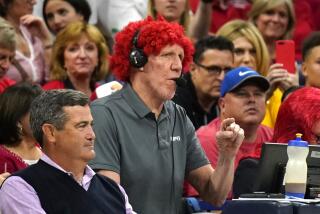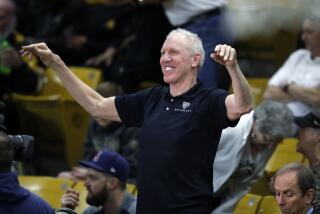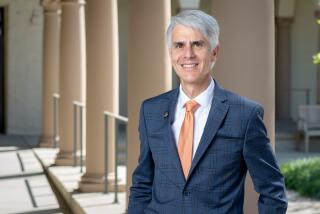Westphal Forgoes Job in Canada : NCAA Rules Block Occidental Coach
- Share via
Bill Westphal, basketball coach at Occidental College, has resigned as coach of the Vancouver Nighthawks of the World Basketball League because an NCAA rule prohibits him from coaching both a professional and college team.
Westphal, the 44-year-old brother of former NBA player Paul Westphal, was scheduled to attend the beginning of Vancouver’s training camp last week but did not show up after Occidental President Richard Gilman informed him such a move would violate the NCAA constitution.
“I was ready to go when the president told me I’d be breaking a rule,” Westphal said Wednesday. “I would have had to sue Occidental and the NCAA to pursue the pro job, but I didn’t want to burn that many bridges.”
Westphal said he first was contacted in January about coaching the Vancouver franchise of the WBL--a newly formed 6-foot-5-and-under league that plays a 54-game summer season--by team General Manager Jerry Weber, a Los Angeles businessman. Westphal was announced as the Nighthawk coach at a press conference March 21 in Vancouver, B. C.
Two days before returning to Vancouver from Los Angeles on April 9, Gilman told Westphal he would have to resign his position at Occidental to coach the Nighthawks.
“I wanted to tell the NCAA to get lost,” Westphal said. “A person has a right to work where he chooses. But I’m the kind of person who likes to do things by the book.”
Westphal said he decided to stay at Occidental because of personal and financial considerations.
According to Rick Evrard, director of legislative services for the NCAA, had Westphal actually coached the Vancouver team he would have violated Section 6 of the NCAA constitution, which reads: “Staff members of a member institution’s athletics department shall not accept compensation or gratuities of any kind whatsoever, either directly or indirectly, for representing a professional sports organization . . .”
Added Evrard: “There is a fundamental principle that there shall remain a clear line between college athletics and professional sports. The NCAA feels that line is clouded when you have a coach who takes on employment with a professional team.”
Gilman, who has worked as a member of the president’s commission of the NCAA, asked officials about granting Westphal a waiver but was flatly denied.
“One high-ranking official told me, ‘Even if you were my mother, I couldn’t give you a waiver,’ ” Gilman said. “The rule is very close to being etched in stone.”
Westphal believes one of the NCAA’s concerns is that a college coach who also coaches a professional team may coerce players to join the professional team before their college eligibility is completed.
“We have no scholarships at Occidental. I don’t see where I’m going to get too many players to go from here to Vancouver,” he said. “It’s ridiculous.”
Westphal said his being “forced” to resign from the Vancouver position cost him “$20,000 after expenses.”
He coached at Occidental from 1973-80 before becoming an assistant for the San Diego Clippers for two years. After coaching at Western Washington for four years, he returned to Occidental in 1986.
More to Read
Go beyond the scoreboard
Get the latest on L.A.'s teams in the daily Sports Report newsletter.
You may occasionally receive promotional content from the Los Angeles Times.










